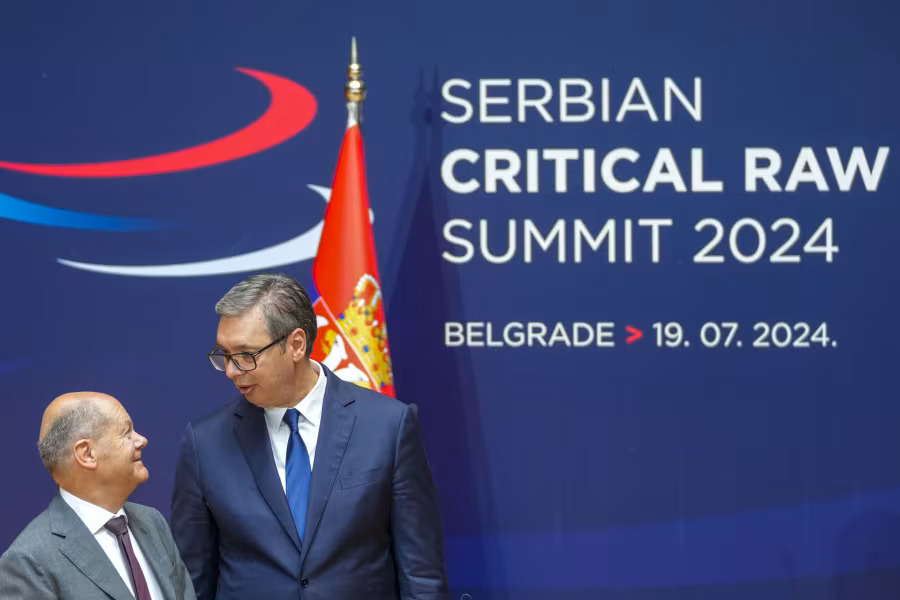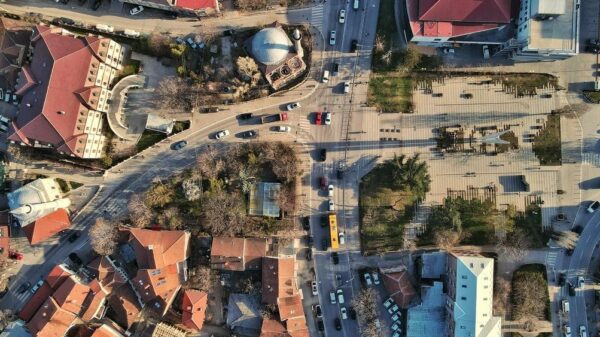The memorandum of understanding signed on July 19 between Serbia and the EU, under the close oversight of German Chancellor, Olaf Scholz, has crystallized the EU’s transactional approach vis-à-vis its own democratic principles and values.
In the framework of this agreement, Belgrade and Brussels formalize a ‘strategic partnership’ on sustainable raw materials, battery value chains and electric vehicles. This arrangement allows the EU to economically rely more on its closer vicinity, gradually moving away from China, at the expense of any kind of democratic or value-based pledge previously made to Serbian society and to those countries awaiting to join the EU.
This deal renders all the more evident that the EU’s suspected ‘appeasement’ to lure Serbia away from the Moscow-Beijing axis did not merely respond to Belgrade’s masterful geopolitical blackmailing, or to the EU’s desire to avoid addressing the elephant in the room, but to a more straightforward rationale of economic convenience. Now, Brussels weaves a new thread into its intricate entanglement with Serbia.
From Hostage to Accomplice
The agreement stems from a controversial lithium mining project managed by the multinational mining company Rio Tinto, namely a $2.4 billion plan to make the Jadar Valley mine, near Loznica in western Serbia, the largest lithium mine in Europe in terms of production.
Environmental activists and opposition voices in the country campaigned heavily against this project via massive street protests in 2021, leading the government to call off the venture in early 2022. Concerns included Rio Tinto’s responsibility for past environmental catastrophes, harm to agriculture and risks of depopulation of the area.
The initiative was swiftly revived following the Serbian Progressive Party’s (SNS) sweeping victory at the country’s December 2023 parliamentary elections, removing all potential institutional, judicial and bureaucratic obstacles within a few months. Equally speedy was the announcement that Serbia and the EU were entering into an agreement thanks to which the latter would be able to strategically diversify its lithium sources, mostly for use in electric car batteries, away from China.
In an attempt to economically detach from Beijing, Brussels found it convenient to invest and recognize Belgrade instead—essentially tying itself further to a regime that is also not democratic, but that proves profitable.
Political Irony Amid Environmental Concerns
The deal came at an ironically significant time, just one day after European Commission President-elect, Ursula von der Leyen, was endorsed for a second term by a substantive majority of Members of the European Parliament, which included, instrumental support from the European Greens..
Through this lithium agreement, progressive political groups in the European Parliament, particularly the Greens, have already failed to hold the President accountable. This task will become increasingly necessary throughout von der Leyen’s second five-year mandate, given the questionable precedent set in Brussels’ relationships with candidate countries.
The European Commission’s upcoming mandate is posed to be uncertain and uneasy, navigating deep ideological fragmentation across the Union’s 27 members. In this context, many more policy decisions, such as those involving the future of the European Green Deal, will be questioned, watered down, or possibly reversed.
Progressive leaderships and parties at the EU level—despite their reduced influence in the European Parliament—must systematically condition their support for von der Leyen’s future agenda on the respect for human rights and environmental standards, including in the Western Balkans. Such concessions, however, will be challenging to secure, as von der Leyen’s favorable ideological leanings toward Meloni’s far-right ECR group could materialize in passing or blocking specific policy items without Green involvement.
The EU has gradually become hostage to Serbia’s geostrategic blackmailing—“neither East nor West or else”—which Brussels is now helping to protect. In an artful and convenient reinvention of its own principles, the European Commission is now actively contributing to Vučić’s emboldened platform of political and economic domination through the vital perpetuation of his power. Brussels has become Belgrade’s perfect accomplice.
As Rio Tinto’s mining venture is being celebrated politically amid diplomatic rejoicing, the expected effects—direct and indirect—that it will bring along for Serbia’s citizens, not least for the Jadar area’s residents, are bleak. The lithium extraction is likely to lead to water and soil contamination and overall environmental degradation, while soaring food prices—considering the high fertility of the region’s land—are likely to follow. Lithium mines are known for involving deforestation and habitat destruction, greenhouse gas emissions, and air pollution given their disruptive and chemical-heavy methods for the extraction of the ores.
Elite Enrichment and Business as Usual
The agreement will primarily contribute to further filling the pockets of the Serbian national and local elites that have been plundering the country’s public and natural resources.
It will also reaffirm the consolidated takeover of peripheral Europe by neoliberal emporia that will, first, go about their business uncontrolled and unpunished, seeking private profit in blatant disregard of public wellbeing.
The foremost EU message to Western Balkan neighbors is clear: “Be profitable or perish”. Merit-based promises of these countries’ EU integration pathways are unlikely to be channeled through due reform, interim benchmarks or even successful implementation, let alone through policy alignment around burning issues—but through mercantile relevance. This becomes all the more significant for the smaller countries in the region, whose weaker economic capacities and lower resource wealth can negatively impact their positioning vis-à-vis the EU’s transactional approach.
The lithium agreement injects a boost into regional leaderships the size of Vučić, Dodik, and Rama, laying bare the little democratic effort it takes to have the EU wrapped around their finger. This adds to the EU’s evident unwillingness to stand behind pro-democratic forces in Serbia and beyond, where pro-European oppositions are barely acknowledged when not outright ignored.
EU and Western Balkan citizens alike can now enjoy an opportunity to understand that, ultimately, a sizeable dimension to the overstretched notion of ‘European strategic autonomy’ boils down to nearshoring the Union’s external needs away from unreliable partners 8,000km away—only to relocate them towards convenient (but equally unreliable) partners in its immediate vicinity. The alarming aftermath of this is unfolding every day.



























































